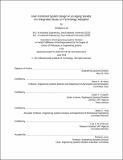User-centered system design in an aging society : an integrated study on technology adoption
Author(s)
Lee, Chaiwoo
DownloadFull printable version (4.926Mb)
Other Contributors
Massachusetts Institute of Technology. Engineering Systems Division.
Advisor
Joseph F. Coughlin.
Terms of use
Metadata
Show full item recordAbstract
The aging of the population is an important global phenomenon that is bringing changes and challenges to various areas of society. Technology has been explored as one way to cope with the complexities and uncertainties that are emerging with this demographic change. However, the responses from the potential user segment have been far from enthusiastic, suggesting that older adults' adoption of technology is not simply a matter of performance and price, but a complex issue that is affected by multiple factors. This dissertation explores the topic of older adults' technology adoption and use with an integrated framework that includes the perceptions, behaviors, and decisions of both the users and the producers. First, an exhaustive set of individual, technical, and social factors are identified and defined from a literature review and from user interviews with descriptions on these factors' importance and roles in the adoption and use process. Second, the results from a large-scale national survey are presented with a discussion of the empirical validity of the factors, as well as their relative importance and associations at three main decision stages of adoption and use -- purchase, initial use, and continued use. Finally, this dissertation presents a set of three cases developed from multiple sources of evidence on existing technology-enabled solutions for aging-in-place. The integrated framework described in this dissertation suggests the importance of considering population aging as a complex issue, as well as a new opportunity, that requires user-centered thinking from various players and stakeholders. Drawing on multiple methods of quantitative and qualitative data collection and analysis, the results underscore the importance and roles of different adoption factors during the design, development, and delivery of technology, as well as in older adults' decisions around adoption and use. This dissertation finds that the various requirements, expectations, and values of older adults are closely related and collectively affect their decisions and behaviors around technology. Finally, a set of implications for research and practice are presented around the need for the continuous involvement of older adults throughout design, development, and delivery of technologies for a changing population.
Description
Thesis: Ph. D., Massachusetts Institute of Technology, Engineering Systems Division, 2014. This electronic version was submitted by the student author. The certified thesis is available in the Institute Archives and Special Collections. Cataloged from student-submitted PDF version of thesis. Includes bibliographical references (pages 229-240).
Date issued
2014Department
Massachusetts Institute of Technology. Engineering Systems DivisionPublisher
Massachusetts Institute of Technology
Keywords
Engineering Systems Division.